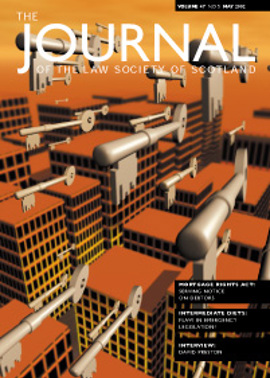In and out of the Houses
The wheels of reform are turning full tilt and the Society’s law reform team is busy working on the many Bills and consultations going through the legislative mill.
Outwith the parliaments, representatives of the Society’s Licensing Law Working Party gave evidence to the Nicholson Committee on reform of the liquor licensing regime and, in particular, on amendments to the Licensing (Scotland) Act 1976.
UK Parliament
The Proceeds of Crime Bill has progressed from the House of Commons to its committee stage in the House of Lords. This legislation will change solicitors’ duties in reporting suspected money laundering. The current subjective test based on knowledge of the client will be replaced by an objective test of whether a solicitor would reasonably suspect funds to be the proceeds of crime. There are also extended provisions for criminal confiscation orders and, for the first time, property will be recoverable through the civil courts in the UK.
The Enterprise Bill will significantly change UK competition law. It will give new powers and status to the Office of Fair Trading, amend the constitution and function of the Competition Commission, create new cartel offences, permit class actions under the EU Injunctions Directive and amend the law of insolvency.
The Tax Law Committee is working with the on-going review of capital gains tax and the consultation process on the Government’s proposals to change stamp duty. The Committee is also considering the Finance Bill following on April’s Budget.
The Scottish Parliament
The Criminal Justice (Scotland) Bill is so wide-ranging that many have compared it to a Miscellaneous Provisions Bill. The content includes public protection, victims’ rights, sexual offences, prisoners, drugs courts, non-custodial punishments, children (including the controversial “smacking proposals”), evidence and procedural issues, new provisions on bribery and corruption, criminal records, local authority functions and amendments to the Public Defence Solicitors scheme, police ranks, jury matters and Northern Irish search warrants. The debates on this Bill will be long and involved and will impact on every criminal law practice.
The Land Reform (Scotland) Bill is about to enter its Stage 2 proceedings where amendments may be proposed. The Society’s team gave extensive evidence to Justice 2 Committee at Stage 1 and the Rural Affairs Committee is drafting amendments for the Committee’s consideration.
The Justice 1 Committee Inquiry into the Regulation of the Legal Profession in Scotland progressed with the recent publication of an options paper for consideration by all involved in the inquiry. The paper sets out the following eleven discussion points:
1. The Committee is not in favour of the option of a completely independent system and believes that it would be more effective to maintain the present system of joint regulation with increased independence. Do you agree?
2. The Committee is aware of the practical difficulties which could be associated with the creation of a single gateway for all complaints. Do you think that a single gateway should be created? If so, how do you think that it would operate in practice?
3. The Committee recommends enhancing the powers of the Scottish Legal Services Ombudsman as outlined in the paper (both in relation to the Law Society of Scotland and the Faculty of Advocates). Do you agree?
4. Whilst the Committee favours strengthening the conciliation process, requiring firms to have a complaints procedure, with a delegated person to deal with complaints, it also recognises that such a procedure could be problematic for small firms and sole practitioners. The Committee seeks views on how the conciliation process could be strengthened in practice.
5. The Committee is inviting views on whether the professional bodies should be encouraged to investigate small negligence claims within the complaints procedure, rather than rejecting these, and referring them to a solicitor.
6. In your view, should compensation be offered for a complaint about an individual solicitor’s conduct? If so, under which circumstances?
7. The Committee favours increasing the maximum level of compensation which a solicitor can be ordered to pay a client in relation to inadequate professional services with provision for regular increases in the maximum compensation. Do you agree? If so, what should the maximum level of compensation be?
8. Do you think that the definitions of a complaint could be amplified and clarified? If so, how could this be achieved?
9. The Committee favours the introduction of delegated powers to allow final decisions about complaints to be made by Committees of the Law Society rather than the Council. Do you agree?
10. Are you of the view that lay involvement in the complaints process for the Law Society of Scotland and the Faculty of Advocates should be increased? If so, how could this be achieved?
11. In your view, how should any recommended changes to the system be funded? Should these changes be funded by:
- the Government;
- the professional bodies; or
- both the Government and the professional bodies?
The full options paper is on the news pages of the Society’s website at www.lawscot.org.uk.
In this issue
- Sleeping with the enemy
- No compelling grounds for retrospective legislatio
- Serving notices under the Mortgage Rights Act
- Breaking the mould
- Karl Construction strikes again
- Lure of the law still strong
- More preparation for practitioners and sheriffs
- The Preston front
- Website reviews
- Finding, keeping, sending
- Omissions cause most claims
- In practice
- A modern way to meet
- Europe
- In and out of the Houses
- Book reviews






